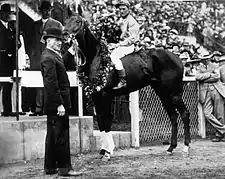1913 Kentucky Derby
The 1913 Kentucky Derby was the 39th running of the Kentucky Derby. The race took place on May 10, 1913.[1] The winning time of 2.04.80 set a new Derby record.[2] With odds of 91–1, winning horse Donerail is the longest odds winner in Kentucky Derby history.[3]
| Kentucky Derby | |
| Grade I stakes race | |
 Donerail after winning the 1913 Kentucky Derby | |
| Location | Churchill Downs |
|---|---|
| Date | May 10, 1913 |
| Winning horse | Donerail |
| Jockey | Roscoe Goose |
| Trainer | Thomas P. Hayes |
| Owner | Thomas P. Hayes |
| Surface | Dirt |
Full results
| Finished | Post | Horse | Jockey | Trainer | Owner | Time / behind |
|---|---|---|---|---|---|---|
| 1st | 5 | Donerail | Roscoe Goose | Thomas P. Hayes | Thomas P. Hayes | 2:04.80 |
| 2nd | 4 | Ten Point | Merritt C. Buxton | Calvin Banks | Anthony L. Aste | 1⁄2 |
| 3rd | 3 | Gowell | John McCabe | John T. Weaver | John T. Weaver | 1+1⁄2 |
| 4th | 8 | Foundation | Johnny Loftus | William L. McDaniel | C. W. McKenna | Head |
| 5th | 6 | Yankee Notions | Buddy Glass | William H. Karrick | Harry K. Knapp | Neck |
| 6th | 1 | Lord Marshall | T. Steele | J. Oliver Keene | J. Oliver & G. Hamilton Keene | 5 |
| 7th | 2 | Jimmie Gill | Charles Borel | Shelby West | L. P. Doerhoefer & Shelby West | 8 |
| 8th | 7 | Leochares | Charles Peak | John F. Schorr | John W. Schorr | 15 |
- Winning Breeder: Thomas P. Hayes; (KY)
- Horses Prince Hermis, Sam Hirsch, Flying Tom, and Floral Park scratched before the race.
Payout

| Post | Horse | Win | Place | Show |
|---|---|---|---|---|
| 5 | Donerail | $ 184.90 | 41.20 | 13.20 |
| 4 | Ten Point | 3.50 | 3.30 | |
| 3 | Gowell | 14.10 |
- The winner received a purse of $5,475.
- Second place received $700.
- Third place received $300.[2]
The 39th "Run for the Roses" still holds the record for the highest for the winner having the highest odds. In a small field of only eight horse Donerail entered the race at 91–1.
Donerail
In 1913, Donerail set a record that still stands today. Owned by Thomas P. Hayes, the thoroughbred entered the Kentucky Derby at 91-1 odds. In fact, Hayes was not convinced that he should enter the horse at all. In a field of only eight horses, the money favorite Ten Point had the best starting position at number four. Donerail started at post five, but passed Ten Point and won by only half a length. Donerail's win was especially remarkable when one considers the economic living standards in 1913. The average household income at the time was about $3,000. The United States was largely made up of farming communities.[4] In today's economy, a $10 bet on Donerail paid out nearly $26,031. The horse would go on to be on the leaderboard in half of his lifetime races. After his record-making win in the Kentucky Derby, Donerail continued to race until 1916, when he was retired to Glen-Helen Farm.[5]
Thomas P. Hayes
Donerail was bred by Thomas P. Hayes, who decided to keep the colt. Hayes chose the thoroughbred's name after a small community near Lexington. Trained by his owner, Donerail's first races were less than impressive and Hayes had no confidence that he was able to perform well in the Kentucky Derby. He told Roscoe Goose, the jockey, to find another mount. Goose continued to beg Hayes to enter Donerail in the Kentucky Derby, and when a friend of Hayes, William J. Treacy paid the entry fee, Donerail was added to the field. The win of Donerail also put Hayes in the history books: it was only the second time in history that the same person bred, trained, and owned the Kentucky Derby winner.[5]
Roscoe Goose
Donerail's jockey Roscoe Goose was a descendent of one of the pioneer families in the Louisville area. He was confident of the potential of the horse and even told friends that he believed Donerail could win the Kentucky Derby. Roscoe's brother, Carl, was also a jockey and he was killed in a riding accident. Roscoe committed to teach and train young jockeys. He was instrumental in adding the requirement for the jockeys to wear helmets. Roscoe Goose became a trainer, breeder, owner, and elder statesman of horse racing. [2]He would mentor the great jockey Eddie Arcaro. In 1963, Roscoe Goose was one of the first athletes named to the Kentucky Athletic Hall of Fame. He died in 1971 and is buried in Louisville's Cave Hill Cemetery.
Derby Day 1913
May 10, 1913, was a beautiful sunny day. The newly renovated Churchill Downs was packed with 30,000 people to watch the race. Twelve horses were expected to compete, but four scratched before the race, leaving a field of only eight. In addition to his record-making odds,[6] Donerail won the Derby with the fastest time recorded to that point. The favored horses for the race that day were Ten Point (at post four), Foundation (at post eight) and Yankee Notions (at post six).
References
- Kentucky Derby History, 1913
- "1913 Kentucky Derby Results Tables" (PDF). Archived from the original (PDF) on 2011-08-14. Retrieved 2010-12-18.
- Long-odds win in Kentucky Derby. BBC Sport.
- "Digital History". www.digitalhistory.uh.edu. Retrieved 2021-12-02.
- Bartholomew, Kaeli (2021-03-09). "Donerail: The 91-1 Longshot Kentucky Derby Winner". Champs of the Track. Retrieved 2021-12-02.
- O'Connor, John Lawrence (1921). History of the Kentucky Derby, 1875-1921. The Library of Congress. [New York, Rider Press, co.]